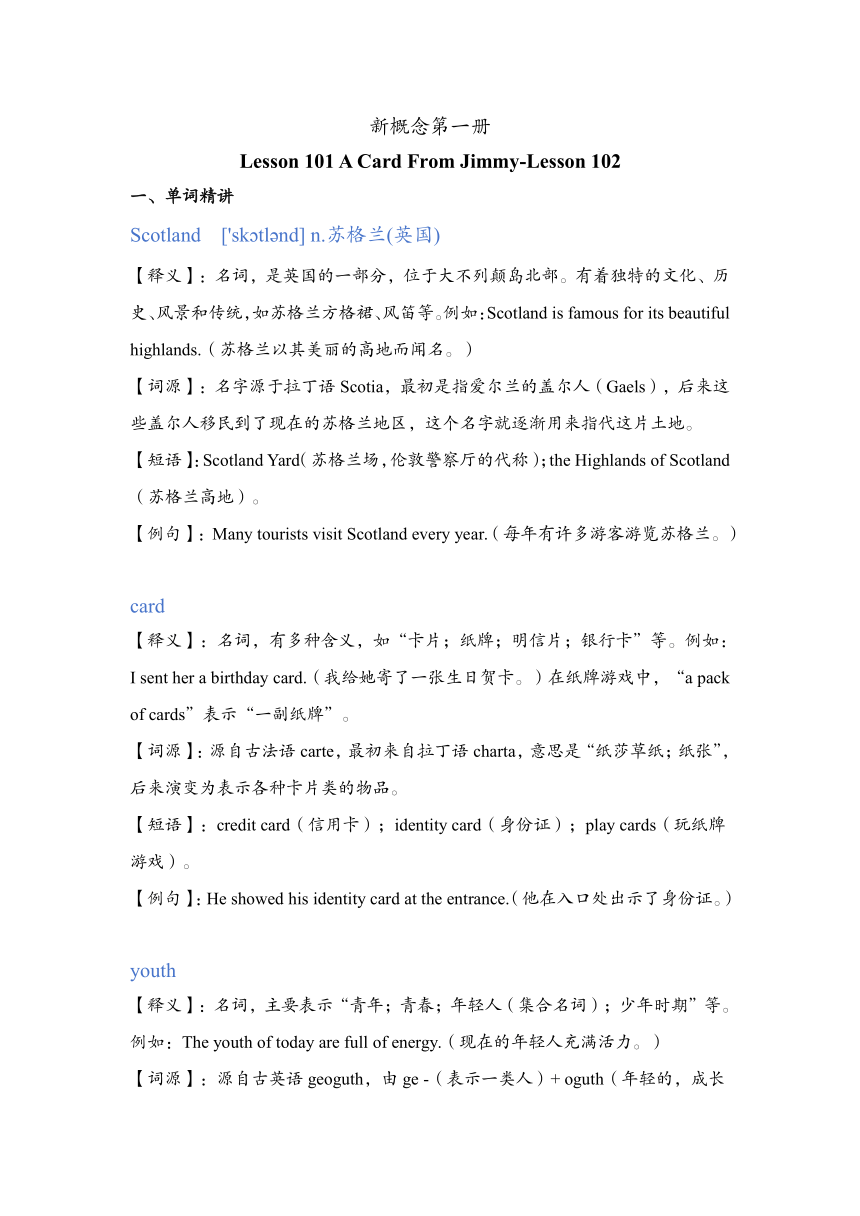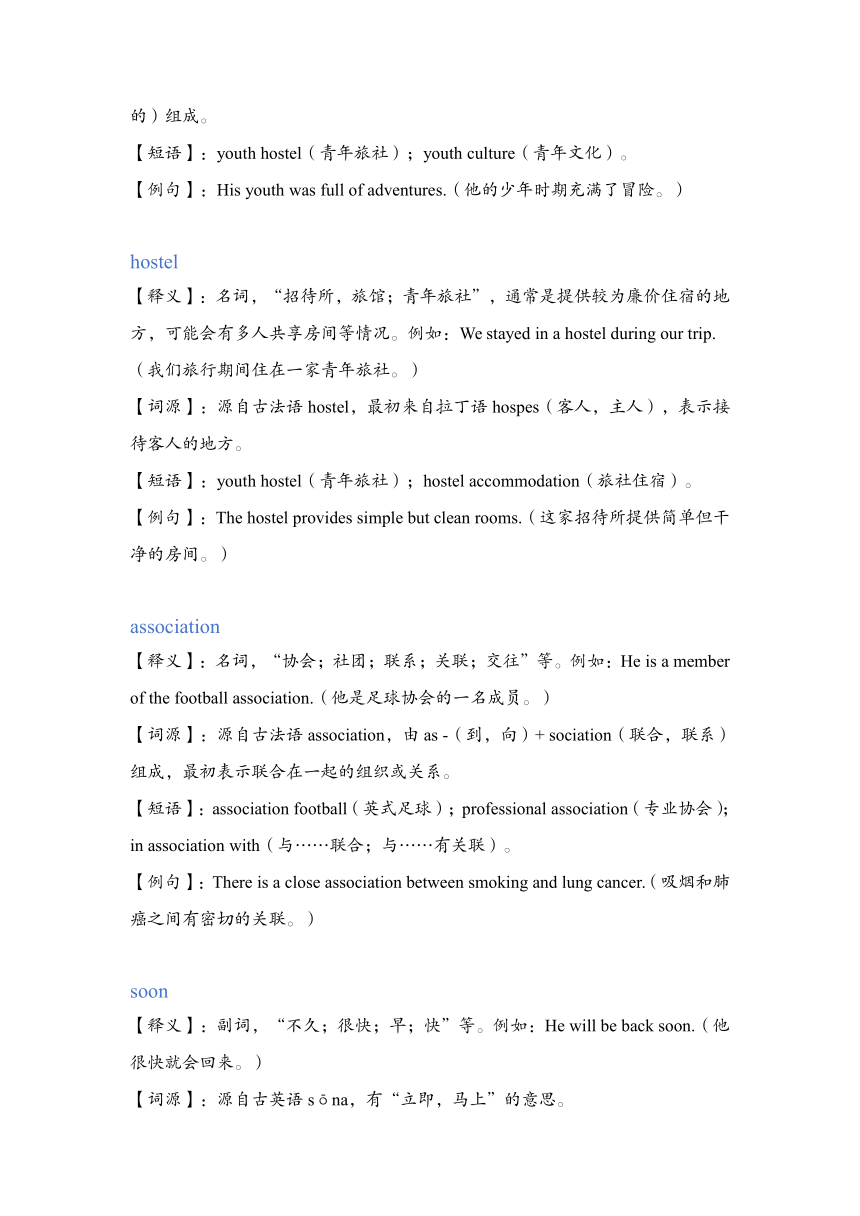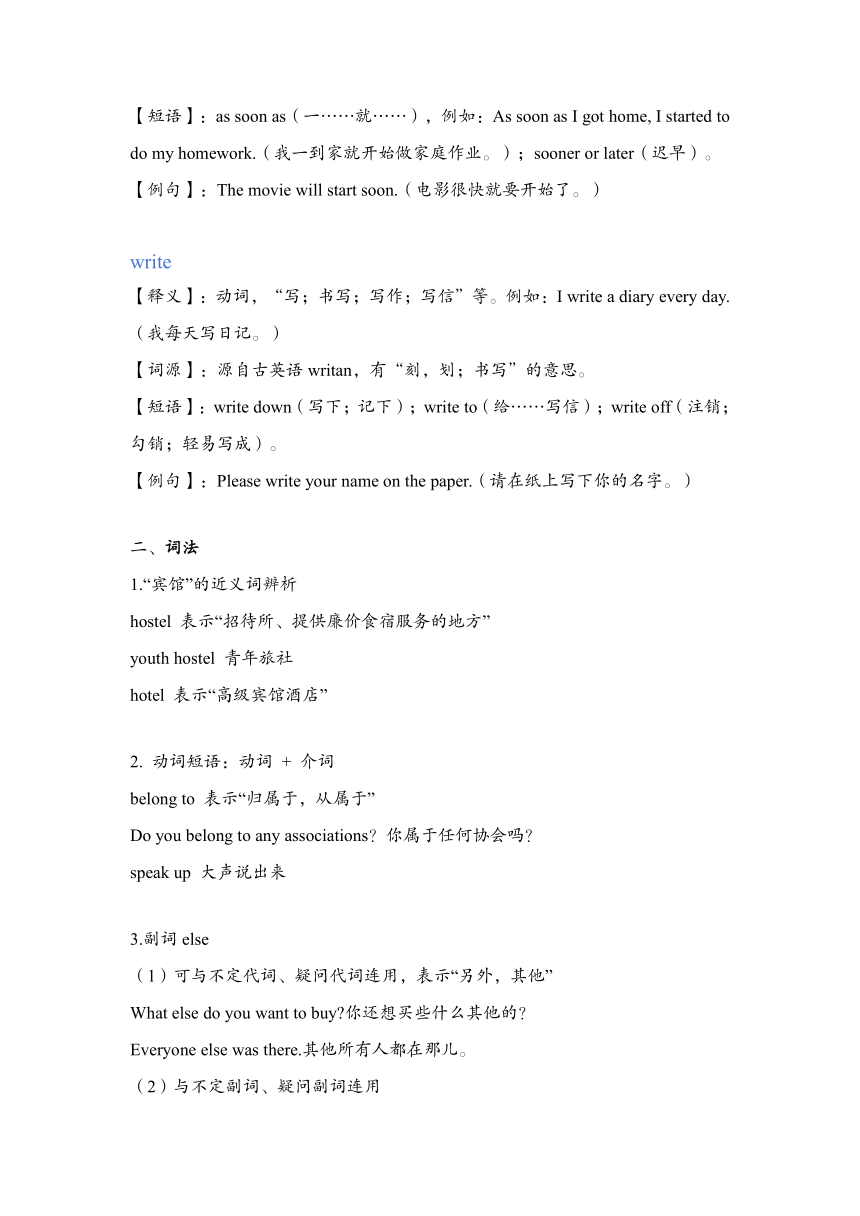新概念第一册Lesson 101 A Card From Jimmy-Lesson 102讲义
文档属性
| 名称 | 新概念第一册Lesson 101 A Card From Jimmy-Lesson 102讲义 |  | |
| 格式 | docx | ||
| 文件大小 | 136.3KB | ||
| 资源类型 | 教案 | ||
| 版本资源 | 新概念英语 | ||
| 科目 | 英语 | ||
| 更新时间 | 2024-12-03 20:35:12 | ||
图片预览



文档简介
新概念第一册
Lesson 101 A Card From Jimmy-Lesson 102
单词精讲
Scotland ['sk tl nd] n.苏格兰(英国)
【释义】:名词,是英国的一部分,位于大不列颠岛北部。有着独特的文化、历史、风景和传统,如苏格兰方格裙、风笛等。例如:Scotland is famous for its beautiful highlands.(苏格兰以其美丽的高地而闻名。)
【词源】:名字源于拉丁语Scotia,最初是指爱尔兰的盖尔人(Gaels),后来这些盖尔人移民到了现在的苏格兰地区,这个名字就逐渐用来指代这片土地。
【短语】:Scotland Yard(苏格兰场,伦敦警察厅的代称);the Highlands of Scotland(苏格兰高地)。
【例句】:Many tourists visit Scotland every year.(每年有许多游客游览苏格兰。)
card
【释义】:名词,有多种含义,如“卡片;纸牌;明信片;银行卡”等。例如:I sent her a birthday card.(我给她寄了一张生日贺卡。)在纸牌游戏中,“a pack of cards”表示“一副纸牌”。
【词源】:源自古法语carte,最初来自拉丁语charta,意思是“纸莎草纸;纸张”,后来演变为表示各种卡片类的物品。
【短语】:credit card(信用卡);identity card(身份证);play cards(玩纸牌游戏)。
【例句】:He showed his identity card at the entrance.(他在入口处出示了身份证。)
youth
【释义】:名词,主要表示“青年;青春;年轻人(集合名词);少年时期”等。例如:The youth of today are full of energy.(现在的年轻人充满活力。)
【词源】:源自古英语geoguth,由ge -(表示一类人)+ oguth(年轻的,成长的)组成。
【短语】:youth hostel(青年旅社);youth culture(青年文化)。
【例句】:His youth was full of adventures.(他的少年时期充满了冒险。)
hostel
【释义】:名词,“招待所,旅馆;青年旅社”,通常是提供较为廉价住宿的地方,可能会有多人共享房间等情况。例如:We stayed in a hostel during our trip.(我们旅行期间住在一家青年旅社。)
【词源】:源自古法语hostel,最初来自拉丁语hospes(客人,主人),表示接待客人的地方。
【短语】:youth hostel(青年旅社);hostel accommodation(旅社住宿)。
【例句】:The hostel provides simple but clean rooms.(这家招待所提供简单但干净的房间。)
association
【释义】:名词,“协会;社团;联系;关联;交往”等。例如:He is a member of the football association.(他是足球协会的一名成员。)
【词源】:源自古法语association,由as -(到,向)+ sociation(联合,联系)组成,最初表示联合在一起的组织或关系。
【短语】:association football(英式足球);professional association(专业协会);in association with(与……联合;与……有关联)。
【例句】:There is a close association between smoking and lung cancer.(吸烟和肺癌之间有密切的关联。)
soon
【释义】:副词,“不久;很快;早;快”等。例如:He will be back soon.(他很快就会回来。)
【词源】:源自古英语sōna,有“立即,马上”的意思。
【短语】:as soon as(一……就……),例如:As soon as I got home, I started to do my homework.(我一到家就开始做家庭作业。);sooner or later(迟早)。
【例句】:The movie will start soon.(电影很快就要开始了。)
write
【释义】:动词,“写;书写;写作;写信”等。例如:I write a diary every day.(我每天写日记。)
【词源】:源自古英语writan,有“刻,划;书写”的意思。
【短语】:write down(写下;记下);write to(给……写信);write off(注销;勾销;轻易写成)。
【例句】:Please write your name on the paper.(请在纸上写下你的名字。)
词法
1.“宾馆”的近义词辨析
hostel 表示“招待所、提供廉价食宿服务的地方”
youth hostel 青年旅社
hotel 表示“高级宾馆酒店”
2. 动词短语:动词 + 介词
belong to 表示“归属于,从属于”
Do you belong to any associations?你属于任何协会吗?
speak up 大声说出来
3.副词else
(1)可与不定代词、疑问代词连用,表示“另外,其他”
What else do you want to buy 你还想买些什么其他的?
Everyone else was there.其他所有人都在那儿。
(2)与不定副词、疑问副词连用
Where else do you want to go 你还想去其他的哪些地方?
(3)相关固定搭配:or else,表“否则,要不然”
Hurry up or else you'll be late. 快点,否则你就要迟到了。
4. 副词soon表“不久,很快,马上”
I will write to you very soon.我会很快写信给你的。
(口语中)固定用法:as soon as possible,表“尽快”
重点句型
1. 直接引语变间接引语:
直接引语的主语是第三人称,其间接引语主语为第三人称不变
He says, 'I have just arrived in Scotland. '
→He says he has just arrived in Scotland.
2. 反义疑问句的结构
反义疑问句:用于确认自己的判断/想法是或不是、对或不对;也可用于表惊讶、愤怒
结构:陈述句+逗号+简略问句”
三大法则:一反一正,人称一致,时态一致
一正一反:逗号前半句若为肯定语气,后半句为否定句式;逗号前半句若为否定语气,则后半句为肯定句式。(前肯后否,前否后肯)
人称一致:前后两个分句必须描述同一(群)人。
时态一致:前后两句时态需保持-致。
She is reading your new book, isn't she 她正在读你的新书,是吗?
Your wife wanted to take a trip to Australia, didn't she 你的妻子曾经想去澳大利亚旅行,是吗?
3. 反义疑问句的用法
用于征求别人的看法,要求别人对自己的话语表示肯定或否定的意见
Your mum doesn't mean that, does she 你妈妈不是那个意思,对吧?
表示讽刺,愤怒,挑衅,惊奇等感彩
You must be Tom, the famous singer,aren't you 你一定是汤姆,那个著名的歌手,不是吗?
当陈述部分带有 few,hardly,little,never,nothing,nowhere,rarely,seldom 等否定词或半否定词时,疑问部分的动词用肯定形式
You have no money in your pocket, do you 你兜里没啥钱,对吧?
4. 直接引语变间接引语
人称代词,物主代词,指示代词和限定词的改变
第一人称的 I,we,my,our 改为第三人称 he/she, they, his/her,their
Tom: I feel tired.
Lily: He says he feels tired.
第二人称的 you,your 改为第一人称,或第三人称
He said to Tom, 'You must repair your car.'
He said to Tom he must repair his car.
第三人称不必发生改变
Mary: Jill has a headache.
Mary says Jill has a headache.
四、课文精讲
1. Read Jimmy's card to me please.
【译文】请把吉米的明信片念给我听听。
【用法】(1)card n.postcard明信片
(2)birthday card生日卡
greeting card祝福卡
name card/calling card名片
(3)read sth.to sb.读给某人听,比如:
Mother is reading a story to herbaby.
妈妈正在给她的小宝宝读故事听。
(4)read sth.for sb.替某人读,比如:
Would youplease read the text for me 你可以替我读一下课文吗
2. I'm afraid I can't hear you.
【译文】我可听不见你念的。
【用法】原句=I'm afraid that I can't hear you.
3. What else does he say
【译文】他还说了些什么?
【用法】(1)else adv.(与不定代词、疑问代词或否定代词或副词连用)另外,其他
Did you see anybody else
What else do you want to say here
(2)(习语)or else否则,要不然:Run or else you will be late.
4. He doesn't say very much,does he
【译文】他没写多少,是吗?
【用法】(1)这是英语中的反意疑问句,它是由两部分组成的,前面是一个陈述句,逗号后是一个简略句。反意疑问句可以用来确认自己的判断,获取真实的信息,还可以用来表示惊讶、愤怒等感情。
(2)如果前一部分陈述句是肯定形式,简略问句就要用否定形式;如果前一部分陈述句是否定形式,简略问句就要用肯定形式。
Jane wanted to take a trip to Australia,didn't she
Tom hasn't washed his hands before lunch time, has he
It's going to rain, isn't it
We won't throw it in the bin,shall we
Lesson 101 A Card From Jimmy-Lesson 102
单词精讲
Scotland ['sk tl nd] n.苏格兰(英国)
【释义】:名词,是英国的一部分,位于大不列颠岛北部。有着独特的文化、历史、风景和传统,如苏格兰方格裙、风笛等。例如:Scotland is famous for its beautiful highlands.(苏格兰以其美丽的高地而闻名。)
【词源】:名字源于拉丁语Scotia,最初是指爱尔兰的盖尔人(Gaels),后来这些盖尔人移民到了现在的苏格兰地区,这个名字就逐渐用来指代这片土地。
【短语】:Scotland Yard(苏格兰场,伦敦警察厅的代称);the Highlands of Scotland(苏格兰高地)。
【例句】:Many tourists visit Scotland every year.(每年有许多游客游览苏格兰。)
card
【释义】:名词,有多种含义,如“卡片;纸牌;明信片;银行卡”等。例如:I sent her a birthday card.(我给她寄了一张生日贺卡。)在纸牌游戏中,“a pack of cards”表示“一副纸牌”。
【词源】:源自古法语carte,最初来自拉丁语charta,意思是“纸莎草纸;纸张”,后来演变为表示各种卡片类的物品。
【短语】:credit card(信用卡);identity card(身份证);play cards(玩纸牌游戏)。
【例句】:He showed his identity card at the entrance.(他在入口处出示了身份证。)
youth
【释义】:名词,主要表示“青年;青春;年轻人(集合名词);少年时期”等。例如:The youth of today are full of energy.(现在的年轻人充满活力。)
【词源】:源自古英语geoguth,由ge -(表示一类人)+ oguth(年轻的,成长的)组成。
【短语】:youth hostel(青年旅社);youth culture(青年文化)。
【例句】:His youth was full of adventures.(他的少年时期充满了冒险。)
hostel
【释义】:名词,“招待所,旅馆;青年旅社”,通常是提供较为廉价住宿的地方,可能会有多人共享房间等情况。例如:We stayed in a hostel during our trip.(我们旅行期间住在一家青年旅社。)
【词源】:源自古法语hostel,最初来自拉丁语hospes(客人,主人),表示接待客人的地方。
【短语】:youth hostel(青年旅社);hostel accommodation(旅社住宿)。
【例句】:The hostel provides simple but clean rooms.(这家招待所提供简单但干净的房间。)
association
【释义】:名词,“协会;社团;联系;关联;交往”等。例如:He is a member of the football association.(他是足球协会的一名成员。)
【词源】:源自古法语association,由as -(到,向)+ sociation(联合,联系)组成,最初表示联合在一起的组织或关系。
【短语】:association football(英式足球);professional association(专业协会);in association with(与……联合;与……有关联)。
【例句】:There is a close association between smoking and lung cancer.(吸烟和肺癌之间有密切的关联。)
soon
【释义】:副词,“不久;很快;早;快”等。例如:He will be back soon.(他很快就会回来。)
【词源】:源自古英语sōna,有“立即,马上”的意思。
【短语】:as soon as(一……就……),例如:As soon as I got home, I started to do my homework.(我一到家就开始做家庭作业。);sooner or later(迟早)。
【例句】:The movie will start soon.(电影很快就要开始了。)
write
【释义】:动词,“写;书写;写作;写信”等。例如:I write a diary every day.(我每天写日记。)
【词源】:源自古英语writan,有“刻,划;书写”的意思。
【短语】:write down(写下;记下);write to(给……写信);write off(注销;勾销;轻易写成)。
【例句】:Please write your name on the paper.(请在纸上写下你的名字。)
词法
1.“宾馆”的近义词辨析
hostel 表示“招待所、提供廉价食宿服务的地方”
youth hostel 青年旅社
hotel 表示“高级宾馆酒店”
2. 动词短语:动词 + 介词
belong to 表示“归属于,从属于”
Do you belong to any associations?你属于任何协会吗?
speak up 大声说出来
3.副词else
(1)可与不定代词、疑问代词连用,表示“另外,其他”
What else do you want to buy 你还想买些什么其他的?
Everyone else was there.其他所有人都在那儿。
(2)与不定副词、疑问副词连用
Where else do you want to go 你还想去其他的哪些地方?
(3)相关固定搭配:or else,表“否则,要不然”
Hurry up or else you'll be late. 快点,否则你就要迟到了。
4. 副词soon表“不久,很快,马上”
I will write to you very soon.我会很快写信给你的。
(口语中)固定用法:as soon as possible,表“尽快”
重点句型
1. 直接引语变间接引语:
直接引语的主语是第三人称,其间接引语主语为第三人称不变
He says, 'I have just arrived in Scotland. '
→He says he has just arrived in Scotland.
2. 反义疑问句的结构
反义疑问句:用于确认自己的判断/想法是或不是、对或不对;也可用于表惊讶、愤怒
结构:陈述句+逗号+简略问句”
三大法则:一反一正,人称一致,时态一致
一正一反:逗号前半句若为肯定语气,后半句为否定句式;逗号前半句若为否定语气,则后半句为肯定句式。(前肯后否,前否后肯)
人称一致:前后两个分句必须描述同一(群)人。
时态一致:前后两句时态需保持-致。
She is reading your new book, isn't she 她正在读你的新书,是吗?
Your wife wanted to take a trip to Australia, didn't she 你的妻子曾经想去澳大利亚旅行,是吗?
3. 反义疑问句的用法
用于征求别人的看法,要求别人对自己的话语表示肯定或否定的意见
Your mum doesn't mean that, does she 你妈妈不是那个意思,对吧?
表示讽刺,愤怒,挑衅,惊奇等感彩
You must be Tom, the famous singer,aren't you 你一定是汤姆,那个著名的歌手,不是吗?
当陈述部分带有 few,hardly,little,never,nothing,nowhere,rarely,seldom 等否定词或半否定词时,疑问部分的动词用肯定形式
You have no money in your pocket, do you 你兜里没啥钱,对吧?
4. 直接引语变间接引语
人称代词,物主代词,指示代词和限定词的改变
第一人称的 I,we,my,our 改为第三人称 he/she, they, his/her,their
Tom: I feel tired.
Lily: He says he feels tired.
第二人称的 you,your 改为第一人称,或第三人称
He said to Tom, 'You must repair your car.'
He said to Tom he must repair his car.
第三人称不必发生改变
Mary: Jill has a headache.
Mary says Jill has a headache.
四、课文精讲
1. Read Jimmy's card to me please.
【译文】请把吉米的明信片念给我听听。
【用法】(1)card n.postcard明信片
(2)birthday card生日卡
greeting card祝福卡
name card/calling card名片
(3)read sth.to sb.读给某人听,比如:
Mother is reading a story to herbaby.
妈妈正在给她的小宝宝读故事听。
(4)read sth.for sb.替某人读,比如:
Would youplease read the text for me 你可以替我读一下课文吗
2. I'm afraid I can't hear you.
【译文】我可听不见你念的。
【用法】原句=I'm afraid that I can't hear you.
3. What else does he say
【译文】他还说了些什么?
【用法】(1)else adv.(与不定代词、疑问代词或否定代词或副词连用)另外,其他
Did you see anybody else
What else do you want to say here
(2)(习语)or else否则,要不然:Run or else you will be late.
4. He doesn't say very much,does he
【译文】他没写多少,是吗?
【用法】(1)这是英语中的反意疑问句,它是由两部分组成的,前面是一个陈述句,逗号后是一个简略句。反意疑问句可以用来确认自己的判断,获取真实的信息,还可以用来表示惊讶、愤怒等感情。
(2)如果前一部分陈述句是肯定形式,简略问句就要用否定形式;如果前一部分陈述句是否定形式,简略问句就要用肯定形式。
Jane wanted to take a trip to Australia,didn't she
Tom hasn't washed his hands before lunch time, has he
It's going to rain, isn't it
We won't throw it in the bin,shall we
同课章节目录
